英语委婉用语
表示“委婉”的各种英语说法
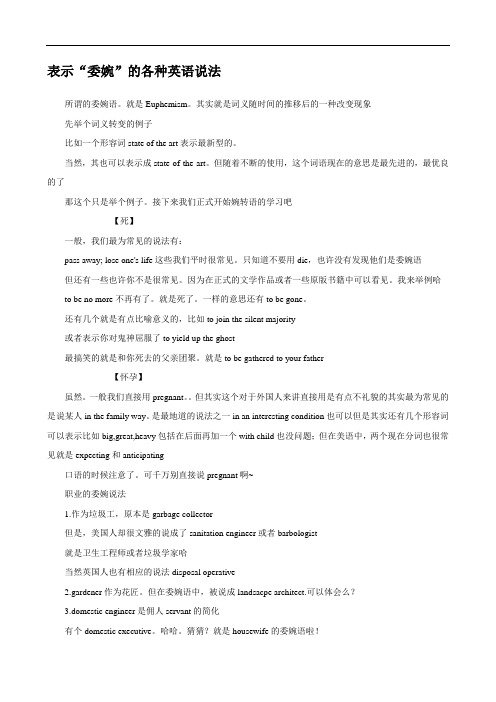
表示“委婉”的各种英语说法所谓的委婉语。
就是Euphemism。
其实就是词义随时间的推移后的一种改变现象先举个词义转变的例子比如一个形容词state of the art表示最新型的。
当然,其也可以表示成state-of-the-art。
但随着不断的使用,这个词语现在的意思是最先进的,最优良的了那这个只是举个例子。
接下来我们正式开始婉转语的学习吧----------------【死】------------------------------一般,我们最为常见的说法有:pass away; lose one's life这些我们平时很常见。
只知道不要用die,也许没有发现他们是委婉语但还有一些也许你不是很常见。
因为在正式的文学作品或者一些原版书籍中可以看见。
我来举例哈to be no more不再有了。
就是死了。
一样的意思还有to be gone。
还有几个就是有点比喻意义的,比如to join the silent majority或者表示你对鬼神屈服了to yield up the ghost最搞笑的就是和你死去的父亲团聚。
就是to be gathered to your father----------------【怀孕】------------------------------虽然。
一般我们直接用pregnant。
但其实这个对于外国人来讲直接用是有点不礼貌的其实最为常见的是说某人in the family way。
是最地道的说法之一in an interesting condition也可以但是其实还有几个形容词可以表示比如big,great,heavy包括在后面再加一个with child也没问题;但在美语中,两个现在分词也很常见就是expecting和anticipating口语的时候注意了。
可千万别直接说pregnant啊~职业的委婉说法1.作为垃圾工,原本是garbage collector但是,美国人却很文雅的说成了sanitation engineer或者barbologist就是卫生工程师或者垃圾学家哈当然英国人也有相应的说法disposal operative2.gardener作为花匠。
表示“委婉”的各种英语说法

表示“委婉”的各种英语说法表示“委婉”的各种英语说法所谓的委婉语。
就是Euphemism。
其实就是词义随时间的推移后的一种改变现象先举个词义转变的例子比如一个形容词state of the art表示最新型的。
当然,其也可以表示成state-of-the-art。
但随着不断的使用,这个词语现在的意思是最先进的,最优良的了那这个只是举个例子。
接下来我们正式开始婉转语的学习吧----------------【死】------------------------------一般,我们最为常见的说法有:pass away; lose one's life这些我们平时很常见。
只知道不要用die,也许没有发现他们是委婉语但还有一些也许你不是很常见。
因为在正式的文学作品或者一些原版书籍中可以看见。
我来举例哈to be no more不再有了。
就是死了。
一样的意思还有to be gone。
还有几个就是有点比喻意义的,比如to join the silent majority 或者表示你对鬼神屈服了to yield up the ghost最搞笑的就是和你死去的父亲团聚。
就是to be gathered to your father----------------【怀孕】------------------------------虽然。
一般我们直接用pregnant。
但其实这个对于外国人来讲直接用是有点不礼貌的其实最为常见的是说某人in the family way。
是最地道的说法之一in an interesting condition也可以但是其实还有几个形容词可以表示比如big,great,heavy包括在后面再加一个with child也没问题;但在美语中,两个现在分词也很常见就是expecting 和anticipating口语的时候注意了。
可千万别直接说pregnant啊~职业的委婉说法1.作为垃圾工,原本是garbage collector但是,美国人却很文雅的说成了sanitation engineer或者barbologist就是卫生工程师或者垃圾学家哈当然英国人也有相应的说法disposal operative2.gardener作为花匠。
英语里面的委婉语
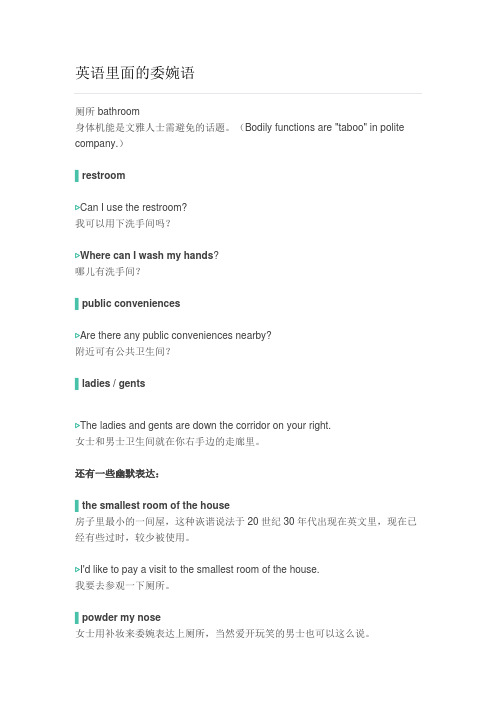
厕所 bathroom身体机能是文雅人士需避免的话题。
(Bodily functions are "taboo" in polite company.)▌restroom▷Can I use the restroom?我可以用下洗手间吗?▷Where can I wash my hands?哪儿有洗手间?▌public conveniences▷Are there any public conveniences nearby?附近可有公共卫生间?▌ladies / gents▷The ladies and gents are down the corridor on your right.女士和男士卫生间就在你右手边的走廊里。
还有一些幽默表达:▌the smallest room of the house房子里最小的一间屋,这种诙谐说法于20世纪30年代出现在英文里,现在已经有些过时,较少被使用。
▷I'd like to pay a visit to the smallest room of the house.我要去参观一下厕所。
▌powder my nose女士用补妆来委婉表达上厕所,当然爱开玩笑的男士也可以这么说。
▷Where can I powder my nose?我上哪儿能补个粉?▌see a man about a dog这种说法原始意思是指为赛马或者赛狗下注,后来通常作为离开或缺席的借口。
原因通常是去上厕所,或者买酒。
▷He's gone to see a man about a dog.他去方便了。
失业unemployment▌between jobs在前一个和后一个工作之间,也就是待业啦。
▷Interviewer: Tell me about your current position.面试官:请告诉我你目前的职位。
▷Job candidate: I'm between jobs right now.求职者:我目前暂时待业。
英语语言文化中的委婉语

英语语言文化中的委婉语
1. Could you possibly... (可能你能...)
2. Would you mind... (你介意...)
3. I was wondering if... (我想知道是否...)
4. Perhaps we could consider... (也许我们可以考虑...)
5. It might be better if... (如果...可能会更好)
6. If it's not too much trouble... (如果不太麻烦的话)
7. I'm sorry, but I'm afraid I can't... (对不起,但恐怕我不能...)
8. I don't want to be a bother, but... (我不想麻烦你,但...)
9. I hope you don't mind if... (希望你不介意如果...)
10. It would be appreciated if... (如果...会受到感激)
11. I'm sorry to trouble you, but... (很抱歉麻烦你,但...)
12. If it's not too much to ask... (如果不过分的话...)
13. I was wondering whether you could... (我在想你是否能...)
14. Excuse me, but would it be possible to... (请问可否...)
15. I would be grateful if... (如果...我会感激不尽)。
英语中的委婉语

(1)Death(死亡)to be asleep in the Arms of God (本义)安睡在上帝的怀中to be at peace (本义)平静了to be at rest (本义)在休息(2)灰色职业shoe maker 补鞋匠→shoe rebuilder 重整鞋者dish washer 洗盘子的人→utensil maintenance 器皿保全工garbage man 清扫垃圾的人→sanitation engineer 清洁工程师butcher 屠夫→meat technologist 肉类技术专家hair-dresser 理发师→cosmetologist 美容师undertaker 承办丧事的人→funeral director 殡仪负责人prostitute 妓女→pavement princess 马路天使maid/ housekeeper (女仆/ 女管家) →domestic help / day-help 家务助手,day-help 白天帮工,live- in help 住家帮手optician (眼镜商) →vision engineer (视力工程师bedding manufacturer (床具制造商)→mattress engineer (床垫工程师) 或sleep engineer (睡眠工程师)School principal ( 中小学校长)→educational engineer ( 教育工程师) (3)上厕所natural necessity (本义)自然的需要nature stop (本义)自然需要停车to pluck a rose (本义)摘朵玫瑰powder one's nose (本义)搽点粉to relieve oneself (本义)轻松一下to wash one's hands (本义)洗洗手(4)厕所powder room(化妆室)、convenience(方便去处)、cloakroom(存衣室)、loo(=waterloo, 滑铁卢)、(5)uglyhomely 不好看plain 平常plain-looking 长相一般ordinary looking 长相一般(6)fat:heavyset 敦实的,富态chubby 丰满的plump丰满的, 圆胖的stout 壮实的(7)thin:slender 苗条的svelte 亭亭玉立的,身材细长的lean 精干的lithe 敏捷的,轻快的(8)她怀孕了A hole out in one (本义) 一击入洞An accident (本义) 事故Awkward (本义) 行动不便的eating for two(本义)吃双份饭to have one watermelon on the vine(本义)藤上有瓜了to have one on the way (本义)有人要来to spoil a woman's shape(本义)坏了女子体型(9)未婚先育She is in trouble.她碰到麻烦。
英语委婉语的例子30个
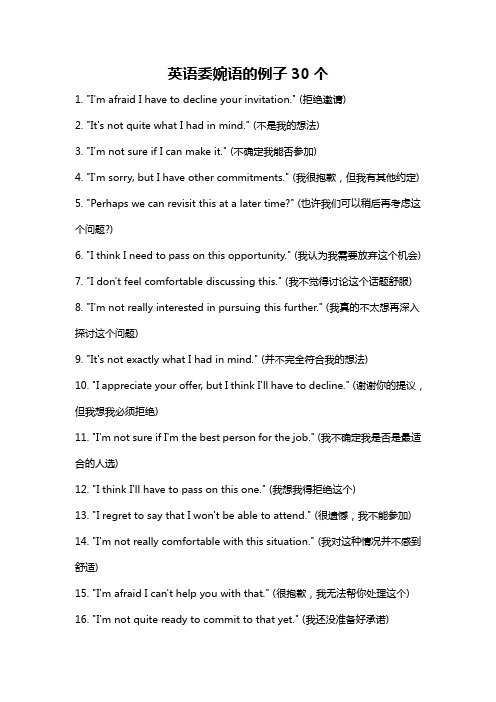
英语委婉语的例子30个1. "I'm afraid I have to decline your invitation." (拒绝邀请)2. "It's not quite what I had in mind." (不是我的想法)3. "I'm not sure if I can make it." (不确定我能否参加)4. "I'm sorry, but I have other commitments." (我很抱歉,但我有其他约定)5. "Perhaps we can revisit this at a later time?" (也许我们可以稍后再考虑这个问题?)6. "I think I need to pass on this opportunity." (我认为我需要放弃这个机会)7. "I don't feel comfortable discussing this." (我不觉得讨论这个话题舒服)8. "I'm not really interested in pursuing this further." (我真的不太想再深入探讨这个问题)9. "It's not exactly what I had in mind." (并不完全符合我的想法)10. "I appreciate your offer, but I think I'll have to decline." (谢谢你的提议,但我想我必须拒绝)11. "I'm not sure if I'm the best person for the job." (我不确定我是否是最适合的人选)12. "I think I'll have to pass on this one." (我想我得拒绝这个)13. "I regret to say that I won't be able to attend." (很遗憾,我不能参加)14. "I'm not really comfortable with this situation." (我对这种情况并不感到舒适)15. "I'm afraid I can't help you with that." (很抱歉,我无法帮你处理这个)16. "I'm not quite ready to commit to that yet." (我还没准备好承诺)17. "I'm not sure that's the best approach." (我不确定那是最好的方法)18. "I don't think this is a good fit for me." (我觉得这不适合我)19. "I'm sorry, I can't make it." (对不起,我不能来)20. "I'd rather not discuss that." (我宁愿不讨论那个)21. "I'm not really looking for a change at the moment." (我现在并不是真的想要改变)22. "I don't think that's a good idea." (我不认为那是个好主意)23. "I'm afraid I have to disagree with you on that." (恐怕我必须在这个问题上与你不同意)24. "I may have to decline this offer." (我可能不得不拒绝这个提议)25. "I'm afraid I can't commit to that right now." (我恐怕现在不能承诺)26. "I'm not really comfortable with the terms." (我不太满意这些条款)27. "I'm afraid I don't have the time for that." (恐怕我没有时间做那个)28. "I don't think that's quite what I had in mind." (我认为那不是我想要的)29. "I'm not really sure what to think about this." (我不是很确定怎么看待这个)30. "I'm afraid I can't provide you with what you're asking for." (恐怕我不能提供你所要求的东西)。
英语委婉语的例子经典

英语委婉语的例子经典1. "I'm afraid that won't be possible." (我恐怕这不太可能。
)2. "Perhaps we could explore some other options." (或许我们可以考虑其他的选择。
)3. "I'm sorry, but that's not quite what I had in mind." (很抱歉,但那不是我想要的。
)4. "I'm not sure that's the best approach." (我不确定那是最好的方式。
)5. "It sounds like we have some differences in opinion." (听起来我们在看法上有些不同。
)6. "I appreciate your input, but I'll need some more time to consider it." (感谢你的建议,但我需要更多时间来考虑它。
)7. "It's not that I don't trust you, but I prefer to err on the side of caution." (不是我不信任你,但我更倾向于谨慎小心。
)8. "I'm sorry, but I'm going to have to decline your invitation." (很抱歉,但我必须拒绝你的邀请。
)9. "I'd love to help, but I'm afraid I'm not available right now." (我很想帮忙,但我恐怕现在没有时间。
英语委婉语

(1)英语中委婉语(一)有关“死亡”的委婉语人们生活中最忌讳的就是死亡,因此语言禁忌中关于死亡的委婉语大量存在。
如:pass away(逝世),be no more(不在了),depart(去世),be gone(走了),join the majority(会见老祖宗去了),go to west(归西了),go to glory(升天了),go to meet one maker(见上帝),to be at peace(平静了),the final departure(最后离去),final sleep(最后一觉),to go to one S long home(回到永久之家),to have found rest(得到安息),in heaven(在天堂),with God(和上帝在一起)等。
与之相对,汉语中有:“去世了”“仙逝了”,“到极乐世界去了”,“逝世”,“谢世”“过世”,“下世”,“不在了”,“走了”,“过去了”,“离开了我们”,“毙命”,“归天”,“长眠”,“与世长辞”对特殊人物还有专门的术语,如:和尚死了叫“圆寂”,皇帝死了叫“驾崩”,诸侯死了用“功甍”,妻子死了叫“断弦”,为了守节而死叫“玉碎”,执行公务而死叫“殉职”,为正义而死叫“牺牲”等。
“死亡的委婉说法还有:to be ;present at the last roll call 出席最后一次点名to be written off被勾销 t0 fall 倒下 to fire one s last shot射出最后一发子弹It S taps.熄灯号音响了to hy down one S life 放下自己的生to make the ultimate sacrifice最后的牺牲to do one S bit 尽自己的本分这些委婉语听起来很平淡,几乎无法使人联到军人那悲壮而惨烈的死。
(二)有关“疾病”的委婉语生病也是人们忌讳说的,因而东、西方人都常常用替代形式来淡化表达。
英语中委婉的说法
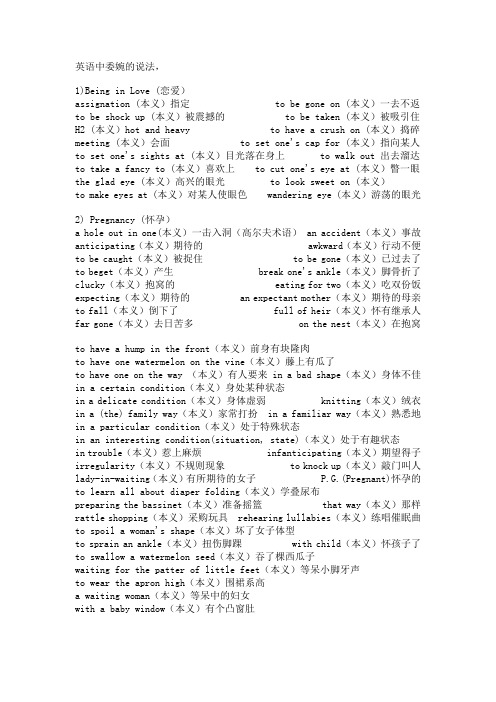
英语中委婉的说法,1)Being in Love (恋爱)assignation (本义)指定 to be gone on (本义)一去不返to be shock up (本义)被震撼的 to be taken (本义)被吸引住H2 (本义)hot and heavy to have a crush on (本义)捣碎meeting (本义)会面 to set one's cap for (本义)指向某人to set one's sights at (本义)目光落在身上 to walk out 出去溜达to take a fancy to (本义)喜欢上 to cut one's eye at (本义)瞥一眼the glad eye (本义)高兴的眼光 to look sweet on (本义)to make eyes at (本义)对某人使眼色 wandering eye (本义)游荡的眼光2) Pregnancy (怀孕)a hole out in one(本义)一击入洞(高尔夫术语) an accident(本义)事故anticipating(本义)期待的 awkward(本义)行动不便to be caught(本义)被捉住 to be gone(本义)已过去了to beget(本义)产生 break one's ankle(本义)脚骨折了clucky(本义)抱窝的 eating for two(本义)吃双份饭expecting(本义)期待的 an expectant mother(本义)期待的母亲to fall(本义)倒下了 full of heir(本义)怀有继承人far gone(本义)去日苦多 on the nest(本义)在抱窝to have a hump in the front(本义)前身有块隆肉to have one watermelon on the vine(本义)藤上有瓜了to have one on the way (本义)有人要来 in a bad shape(本义)身体不佳in a certain condition(本义)身处某种状态in a delicate condition(本义)身体虚弱 knitting(本义)绒衣in a (the) family way(本义)家常打扮 in a familiar way(本义)熟悉地in a particular condition(本义)处于特殊状态in an interesting condition(situation, state)(本义)处于有趣状态in trouble(本义)惹上麻烦 infanticipating(本义)期望得子irregularity(本义)不规则现象 to knock up(本义)敲门叫人lady-in-waiting(本义)有所期待的女子 P.G.(Pregnant)怀孕的to learn all about diaper folding(本义)学叠尿布preparing the bassinet(本义)准备摇篮 that way(本义)那样rattle shopping(本义)采购玩具 rehearing lullabies(本义)练唱催眠曲to spoil a woman's shape(本义)坏了女子体型to sprain an ankle(本义)扭伤脚踝 with child(本义)怀孩子了to swallow a watermelon seed(本义)吞了棵西瓜子waiting for the patter of little feet(本义)等呆小脚牙声to wear the apron high(本义)围裙系高a waiting woman(本义)等呆中的妇女with a baby window(本义)有个凸窗肚3)Defecation (如厕)to be caught short (本义)给了个冷不妨 to fix one's face (本义)化装the call of nature (本义)自然的需要 to freshen up (本义)梳洗打扮Can I add some powder? (本义)我可以茶点粉吗?to cash(write) a check (本义)兑(开)张支票 evacuation (本义)排空to do a job for oneself (本义)做点私事 to excrete (本义)排泄do one's business (本义)干自己的活 to do one's duty (本义)尽职to ease oneself (本义)自我轻松一下 to eliminate (本义)逐出to find a haven of rest (本义)寻找安息所to get some fresh air (本义)去呼吸一点新鲜空气to give oneself ease (本义)使自己舒服一下to go into retreat (本义)去僻静 to go somewhere (本义)出去一下to go to Egypt (本义)到埃及去 powder one's nose (本义)搽点粉to go to one's private office (本义)到私人办公室去May I adjourn? (本义)我可以变换一下地方吗?natural necessity (本义)自然的需要 nature stop (本义)自然需要停车to pluck a rose (本义)摘朵玫瑰 to relieve oneself (本义)轻松一下4)Death(死亡)to be asleep in the Arms of God (本义)安睡在上帝的怀中to be at peace (本义)平静了 to be at rest (本义)在休息to be called to God (本义)被召唤到上帝那 to rest (本义)休息to be called home (本义)被召回家 to depart (本义)离去to be home and free (本义)到家自由了 to go home (本义)回家to be taken to paradise (本义)被送进天堂 happy land (本义)乐土The call of God (本义)上帝的召唤 final sleep (本义)最后一觉The final departure (本义)最后离去 to go to heaven (本义)进天堂to go to one's long home (本义)回到永久之家 in heaven (本义)在天堂to go to one's own place (本义)回老家 to sleep (本义)长眠to have fallen asleep (本义)入睡了 to rest in peace (本义)安息to have found rest (本义)得到安息 to pay one's fee (本义)付费to have gone to a better place(land,world,life)到一个更好得地方去了to join one's ancestors (本义)加入先人的行列join the Great majority (本义)加入大多数 to fall (本义)倒下了to leave this world (本义)离开今世 to return to dust (本义)归之尘土with God (本义)和上帝在一起 with their Father (本义)与圣父在一起to do one's bit (本义)尽职了 to be out of pain (本义)摆脱痛苦to lay down one's life (本义)放下自己的生命 to expire (本义)呼气to be no longer with us (本义)不再与我们在一起to breathe one's last (本义)呼了最后一口气 to go off (本义)离去to cancel one's account (本义)销帐 to be gone (本义)去了pay one's last debt (本义)付最后一笔债 to fade away (本义)消失to make one's exit (本义)退场 to kick off (本义)开球to be free (本义)解脱了 to be no more (本义)不复存在to close one's eyes (本义)瞑目 to come to an end (本义)结束to go beyond (本义)到远方去 to go one's last (本义)走到自己的终点to go one's place (本义)回老家 to go to west (本义)西去to go to one's resting place (本义)到休息地去to kick the bucket (本义)踢翻水桶 to stop living (本义)停止生存to lose one's life (本义)失去了生命 to pass away (本义)离去to take one's rest (本义)休息 to shut up the shop (本义)关门英语构词法一. 常见的前缀1.表示否定意义的前缀1)纯否定前缀a-, an-, asymmetry(不对称)anhydrous(无水的)dis- dishonest, dislikein-, ig-, il, im, ir, incapable, inability, ignoble, impossible, immoral, illegal, irregularne-, n-, none, neither, never ;non-, noesense ; neg-, neglect un- unable, unemployment2)表示错误的意义male-, mal-, malfunction, maladjustment(失调)mis-, mistake, mislead ;pseudo-, pseudonym(假名), pseudoscience 3)表示反动作的意思de-, defend, demodulation(解调) ; dis-, disarm, disconnectun-, unload, uncover4)表示相反,相互对立意思anti-, ant- antiknock( 防震), antiforeign,(排外的)contra-, contre-, contro-, contradiction, controflow(逆流)counter-, counterreaction, counterbalanceob-, oc-, of-, op-, object, oppose, occupywith-, withdraw, withstand2. 表示空间位置,方向关系的前缀1)a- 表示“在……之上”,“向……”:aboard, aside,2)by- 表示“附近,邻近,边侧”:bypath, bypass(弯路)3)circum-, circu-, 表示“周围,环绕,回转”:circumstance, circuit4)de-, 表示“在下,向下”:descend, degrade5)en-, 表示“在内,进入”:encage, enbed(上床)6)ex-, ec-, es-, 表示“外部,外”:exit, eclipse, expand, export7)extra-, 表示“额外”:extraction (提取)8)fore- 表示“在前面”:forehead, foreground9)in-, il-, im-, ir-, 表示“向内,在内,背于”inland, invade, inside, import10)inter-, intel-, 表示“在……间,相互”international, interaction, internet11)intro-, 表示“向内,在内,内侧”:introduce, introduce12)medi-, med-, mid-, 表示“中,中间”:Mediterranean, midposition13)out-, 表示“在上面,在外部,在外”:outline, outside, outward14)over-, 表示“在上面,在外部,向上”:overlook, overhead, overboard15)post-, 表示"向后,在后边,次”:postscript(附言),16)pre-, 表示"在前”在前面”:prefix, preface, preposition17)pro-, 表示“在前,向前”:progress, proceed,18)sub-, suc-, suf-, sug-, sum-, sup-, sur-, sus-, 表示“在下面,下”subway, submarine, suffix, suppress, supplement19)super-, sur-, 表示“在…..之上”superficial, surface, superstructure20)trans-, 表示“移上,转上,在那一边”translate, transform, transoceanic21)under-, 表示“在…..下面,下的”:underline, underground, underwater22)up-, 表示“向上,向上面,在上”:upward, uphold, uphill(上坡)3. 表示时间,序列关系的前缀1)ante-, anti-, 表示“先前,早于,预先”:antecedent, anticipate,2)ex-, 表示“先,故,旧”:expresident, exhusband3)fore-, 表示“在前面,先前,前面”:foreward, dorecast, foretell(预言)4)mid-, medi-, 表示“中,中间”:midnight, midsummer5)post-"表示“在后,后”:postwar,6)pre-, pri-, 表示“在前,事先,预先”:preheat, prewar, prehistory7)pro-, 表示“在前,先,前”:prologue(序幕),prophet(预言家)8)re-, 表示“再一次,重新”:retell, rewrite4. 表示比较程度差别关系的前缀1)by-, 表示“副,次要的”:byproduct, bywork(副业)2)extra-,表示“超越,额外”:extraordinary,3)hyper- 表示“超过,极度”:hypersonic(超声波), hypertesion(高血压)4)out-,表示“超过,过分”:outdo(超过), outbid(出价过高的人)5)over-,表示“超过,过度,太”:overeat, overdress, oversleep6) sub-, suc-, sur-, 表示“低,次,副,亚”subeditor, subordinate, subtropical(亚热带)7)super-, sur- 表示“超过”:supernature, superpower, surplus, surpass8)under-,表示“低劣,低下”undersize, undergrown, underproduction(生产不足)9)vice- 表示“副,次”:vicepresident, vicechairman5. 表示共同,相等意思的前缀1)com-, cop-, con-, cor-, co- 表示“共同,一起”。
盘点:英语中那些委婉的语句是如何表达的

盘点:英语中那些委婉的语句是如何表达的在汉语中,进厂有许多委婉的词汇,其实在英语中也一样,今天小编给大家讲讲英语中那些委婉的语句是如何表达的。
死(death)这个词无论在什么样的文化当中,都是令人忌讳的。
在很多情况下,人们总是寻找一些中性的或具有积极意义的词汇来形容它。
汉语中就有“他走了”、“去见马克思了”等说法,英语中同样有许多“死”的委婉说法。
如:to pass away,to go home,to go,to go West,to breathe one's last,to be at rest,to depart,to be with God,to be in Heaven,to join the majority,to join one's ancestors,to fall asleep等。
例句:①Poor Milton was one of those who went West inthe air-crash.可怜的密尔顿是这次空难遇难者之一。
②His father passed away when he was only five.当他只有五岁时,他的父亲就去世了。
③He worked until he breathed his last.他一直工作到他生命的最后一刻。
除了“死”以外,还有其它许多词汇具有委婉的表达方式。
有些还需引起我们特别的注意,因为忽视或滥用这些用法有时会引起误解。
曾有一个中学生在公园中对一位外宾想要“洗手”(washone's hands)而感到大惑不解,连说“No water”(没有水)。
其实wash one's hands只是go to the toilet(lavatory)(上厕所)的委婉的说法。
厕所的其它表达方法还有comfort loom,men's(ladies')room,powderroom,cloakroom,washroom。
英语委婉语词典

英语委婉语词典收录了大量常用的英语委婉语,可以帮助读者了解英语语言中表达礼貌和避免冒犯他人的常用词汇和表达方式。
以下是一些常见的英语委婉语:
"deceased":已故的,代替"dead"
"temporarily challenged":有残疾的,代替"handicapped"
"differently abled":有特殊能力的,代替"disabled"
"final resting place":坟墓,代替"grave"
"ironing board":铁板,代替"flat iron"
"weight-watcher":减肥者,代替"obese person"
"WC":洗手间,代替"toilet"
"charm offensive":花言巧语,代替"lying"
"potting shed":卫生间,代替"toilet"
"comfort station":公共厕所,代替"public restroom"
以上仅是一些常见的英语委婉语示例,实际上英语委婉语的数量非常庞大,而且随着时代的变化和语境的不同,委婉语的用法也在不断变化。
英语中的委婉语

英语euphemism(委婉语)一词源于希腊语的前缀eu(好的)和词根pheme(说话),意为good speak(说好听的或者善辞令)。
委婉语的出现和应用与语言禁忌有直接的关系。
既然人们讳言某些事物,而在言语交际中又不能完全避开它们,于是迂回婉转的表达方式,即委婉语应运而生。
人们讳言die(死),因而有了pass away, pass out, pass over(去世)之类的委婉说法。
在交际活动中,人们出于礼貌,不愿直言某些事情,以免引起不快。
对于一位身体肥胖的女士来说,人们更愿意说她put on weight(发了福)而忌说become fat(长胖了)。
不言而喻,委婉语具有重要的社会功能。
一方面,它可以维持语言禁忌的施使和效能;另一方面,它可以用来保持良好的人际关系,促进言语交际的正常进行。
不管是西方人还是东方人,大家都忌言死。
因此,就出现了大量关于死的委婉语,它们形式多样,各有异同。
上面已经提到了死的三种委婉说法,实际上远不止这些。
比如还有:to go to a better world(到极乐世界去了);to go to another world(到另一个世界去了);to go to heaven(上天堂去了);to depart(故去);to be gone(走了,没了);to pay one’s debt to nature (向大自然还债了);to breathe one’s last(咽下了最后一口气);troubles be over now(罪受完了),等等。
死对人们来说是一种不愉快的事情,但英语在委婉陈述这一事实时多数用了比喻的手段,表达了人们一种良好的愿望,要去天堂,要去极乐世界。
另外,认为死是一种解脱,受完了罪还完了债,一切都了结了。
委婉语还用来表达人们讳言的生理行为,如大小便、怀孕、生殖、性行为等。
这在英语和汉语都是十分普遍的语言现象。
虽然人们天天使用厕所,进行大小便,但在指称它们时多数避免直说。
英语委婉语
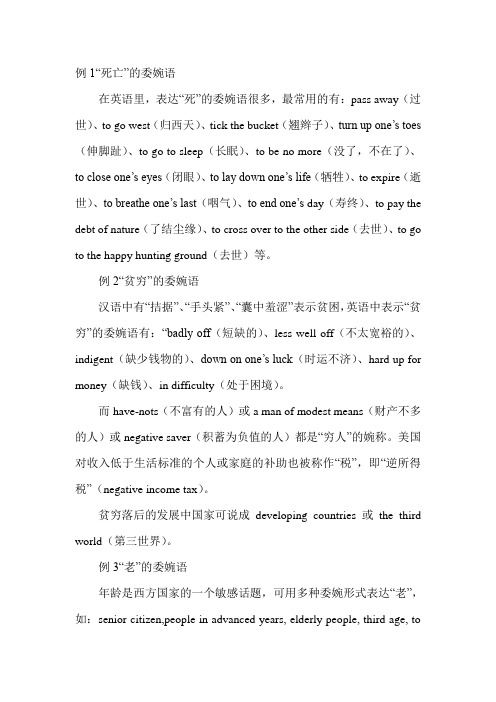
例1“死亡”的委婉语在英语里,表达“死”的委婉语很多,最常用的有:pass away(过世)、to go west(归西天)、tick the bucket(翘辫子)、turn up one’s toes (伸脚趾)、to go to sleep(长眠)、to be no more(没了,不在了)、to close one’s eyes(闭眼)、to lay down one’s life(牺牲)、to expire(逝世)、to breathe one’s last(咽气)、to end one’s day(寿终)、to pay the debt of nature(了结尘缘)、to cross over to the other side(去世)、to go to the happy hunting ground(去世)等。
例2“贫穷”的委婉语汉语中有“拮据”、“手头紧”、“囊中羞涩”表示贫困,英语中表示“贫穷”的委婉语有:“badly off(短缺的)、less well off(不太宽裕的)、indigent(缺少钱物的)、down on one’s luck(时运不济)、hard up for money(缺钱)、in difficulty(处于困境)。
而have-nots(不富有的人)或a man of modest means(财产不多的人)或negative saver(积蓄为负值的人)都是“穷人”的婉称。
美国对收入低于生活标准的个人或家庭的补助也被称作“税”,即“逆所得税”(negative income tax)。
贫穷落后的发展中国家可说成developing countries或the third world(第三世界)。
例3“老”的委婉语年龄是西方国家的一个敏感话题,可用多种委婉形式表达“老”,如:senior citizen,people in advanced years, elderly people, third age, tofeel one’s age, mature等。
英语委婉语的例子
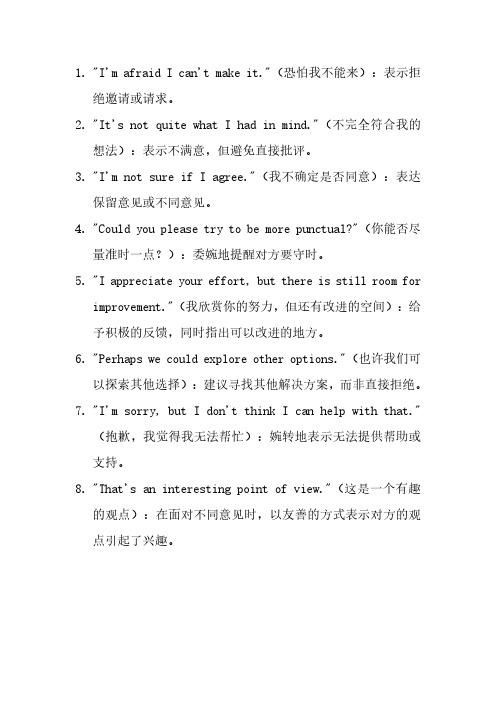
1."I'm afraid I can't make it."(恐怕我不能来):表示拒
绝邀请或请求。
2."It's not quite what I had in mind."(不完全符合我的
想法):表示不满意,但避免直接批评。
3."I'm not sure if I agree."(我不确定是否同意):表达
保留意见或不同意见。
4."Could you please try to be more punctual?"(你能否尽
量准时一点?):委婉地提醒对方要守时。
5."I appreciate your effort,but there is still room for
improvement."(我欣赏你的努力,但还有改进的空间):给予积极的反馈,同时指出可以改进的地方。
6."Perhaps we could explore other options."(也许我们可
以探索其他选择):建议寻找其他解决方案,而非直接拒绝。
7."I'm sorry,but I don't think I can help with that."
(抱歉,我觉得我无法帮忙):婉转地表示无法提供帮助或支持。
8."That's an interesting point of view."(这是一个有趣
的观点):在面对不同意见时,以友善的方式表示对方的观点引起了兴趣。
英语中的委婉语

英语中的委婉语(总8页)--本页仅作为文档封面,使用时请直接删除即可----内页可以根据需求调整合适字体及大小--英语中的委婉语委婉来自希腊语,eu 是好的意思,phemism 是speech (言语)的意思,整个字面的意思是word of good omen (吉祥)或好的说法。
一般认为,凡是表示禁忌或敏感事物的含蓄、迂回或动听的语言,均属委婉语。
由此可知,委婉语不仅是人们交际的需要,更是言语交际中维系人们社会关系和人际关系的重要手段。
随着社会的进步,人类文明的发展,委婉语始终伴随着整个社会的言语交际过程,且表现出极强的言语交际功能。
由于委婉语在英语中应用比较广泛,所以了解委婉语的交际功能对于我们学好英语、进行有效的跨文化交际有很大帮助。
本文从社会语言学的角度,试图通过具体的语言实例,探究在特定的语言环境下英语委婉语的交际功能。
一、委婉语的“避讳”功能语言禁忌起源于古希腊,古罗马时期人们对神的敬畏。
在人类文明的早期,科学尚不发达,人们对一些自然现象还不能认识和解释,对人的自身也认识不足,常常因感某种神秘力量而内心深怀恐惧,在口头语言表达上为一种不愿言、不敢言,久而久之就成为一种语言的禁忌,但因相互交流的需要,有时又不得不表达出此种意思,于是人们逐渐学会了用避讳的话委婉地表达;委婉语也因而产生,并被广泛应用。
这样,避讳禁忌、消除恐惧便成了委婉语的第一功能。
例如Satan 被称为the good man,the great fellow ,Devil 被称为the Big D 及Lord of the Flies. 人们对“死亡”的恐惧必然导致大量有关“死亡”的委婉语的产生。
讲英语国家的人们和许多其他民族的人民一样,忌讳直接说“死”(to die)字,创造了很多表达“死”的意思的委婉语。
例如,人们常用“去了”(to pass away),“离别了”(to depart),“离开了我们”(to leave us),“睡着了”(to go to sleep),“去天国”(to go to heaven),“心脏停止了跳动”(one’s heart has stopped beating),等词来代替说某人“死了”(to die),因为“死”太神秘、太痛苦、太让人恐怖了。
英语中那些委婉的语句

英语中那些委婉的语句(最新版)编制人:__________________审核人:__________________审批人:__________________编制单位:__________________编制时间:____年____月____日序言下载提示:该文档是本店铺精心编制而成的,希望大家下载后,能够帮助大家解决实际问题。
文档下载后可定制修改,请根据实际需要进行调整和使用,谢谢!并且,本店铺为大家提供各种类型的经典范文,如教案大全、教学资料、作文大全、演讲致辞、祝福语、名言句子、感悟故事、心得体会、总结报告、工作计划、党团资料、条据书信、合同协议、其他范文等等,想了解不同范文格式和写法,敬请关注!Download tips: This document is carefully compiled by this editor.I hope that after you download it, it can help you solve practical problems. The document can be customized and modified after downloading, please adjust and use it according to actual needs, thank you!In addition, this shop provides you with various types of classic sample essays, such as teaching plans, teaching materials, essays, speeches, blessings, famous quotes, sentences, insights, experiences, summary reports, work plans, party and group information, and rules Letters, contract agreements, other sample essays, etc. If you want to know the format and writing of different sample essays, stay tuned!英语中那些委婉的语句商务语言是商务群体广泛使用的一种特定语言,其内容和读者有很强的针对性。
英语委婉语气表达法
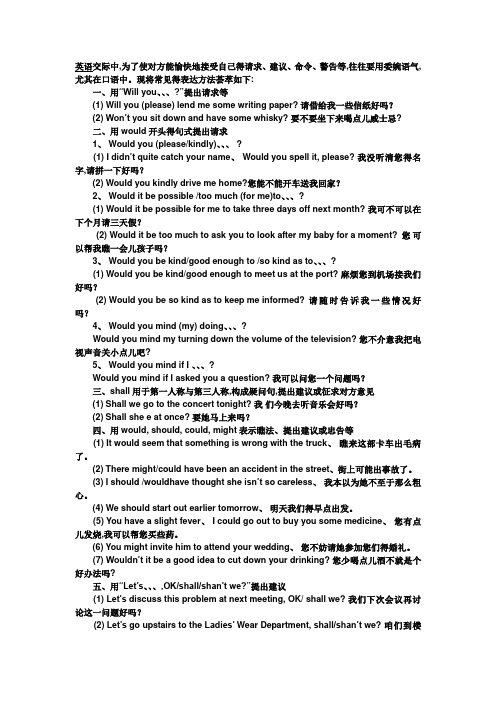
英语交际中,为了使对方能愉快地接受自己得请求、建议、命令、警告等,往往要用委婉语气,尤其在口语中。
现将常见得表达方法荟萃如下:一、用“Will you、、、?”提出请求等(1) Will you (please) lend me some writing paper? 请借给我一些信纸好吗?(2) Won’t you sit down and have some whisky? 要不要坐下来喝点儿威士忌?二、用would开头得句式提出请求1、 Would you (please/kindly)、、、 ?(1) I didn’t quite catch your name、 Would you spell it, please? 我没听清您得名字,请拼一下好吗?(2) Would you kindly drive me home?您能不能开车送我回家?2、 Would it be possible /too much (for me)to、、、?(1) Would it be possible for me to take three days off next month? 我可不可以在下个月请三天假?(2) Would it be too much to ask you to look after my baby for a moment? 您可以帮我瞧一会儿孩子吗?3、 Would you be kind/good enough to /so kind as to、、、?(1) Would you be kind/good enough to meet us at the port? 麻烦您到机场接我们好吗?(2) Would you be so kind as to keep me informed? 请随时告诉我一些情况好吗?4、 Would you mind (my) doing、、、?Would you mind my turning down the volume of the television? 您不介意我把电视声音关小点儿吧?5、 Would you mind if I 、、、?Would you mind if I asked you a question? 我可以问您一个问题吗?三、shall用于第一人称与第三人称,构成疑问句,提出建议或征求对方意见(1) Shall we go to the concert tonight? 我们今晚去听音乐会好吗?(2) Shall she e at once? 要她马上来吗?四、用would, should, could, might表示瞧法、提出建议或忠告等(1) It would seem that something is wrong with the truck、瞧来这部卡车出毛病了。
英语委婉语资料
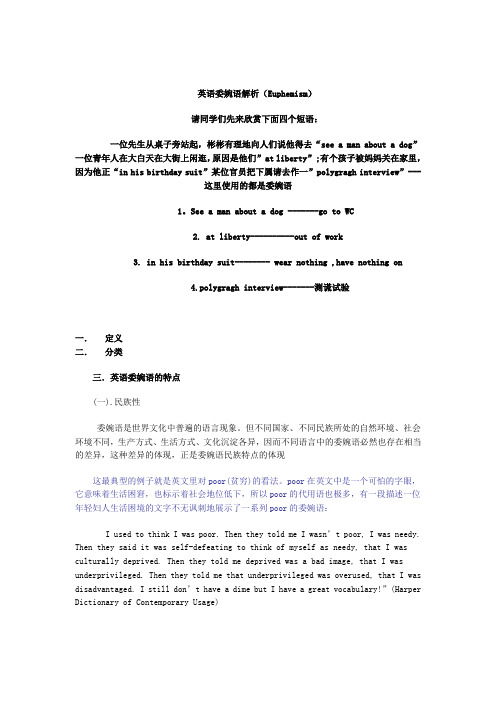
英语委婉语解析(Euphemism)请同学们先来欣赏下面四个短语:一位先生从桌子旁站起,彬彬有理地向人们说他得去“see a man about a dog”一位青年人在大白天在大街上闲逛,原因是他们”at liberty”;有个孩子被妈妈关在家里,因为他正“in his birthday suit”某位官员把下属请去作一”polygragh interview”---这里使用的都是委婉语1。
See a man about a dog -------go to WC2. at liberty----------out of work3. in his birthday suit-------- wear nothing ,have nothing on4.polygragh interview-------测谎试验一.定义二.分类三.英语委婉语的特点(一).民族性委婉语是世界文化中普遍的语言现象。
但不同国家、不同民族所处的自然环境、社会环境不同,生产方式、生活方式、文化沉淀各异,因而不同语言中的委婉语必然也存在相当的差异,这种差异的体现,正是委婉语民族特点的体现这最典型的例子就是英文里对poor(贫穷)的看法。
poor在英文中是一个可怕的字眼,它意味着生活困窘,也标示着社会地位低下,所以poor的代用语也极多,有一段描述一位年轻妇人生活困境的文字不无讽刺地展示了一系列poor的委婉语:I used to think I was poor. Then they told me I wasn’t poor, I was needy. Then they said it was self-defeating to think of myself as needy, that I was culturally deprived. Then they told me deprived was a bad image, that I was underprivileged. Then they told me that underprivileged was overused, that I was disadvantaged. I still don’t have a dime but I have a great vocabulary!”(Harper Dictionary of Contemporary Usage)这段话的大意是:“起初我认为自己贫穷。
- 1、下载文档前请自行甄别文档内容的完整性,平台不提供额外的编辑、内容补充、找答案等附加服务。
- 2、"仅部分预览"的文档,不可在线预览部分如存在完整性等问题,可反馈申请退款(可完整预览的文档不适用该条件!)。
- 3、如文档侵犯您的权益,请联系客服反馈,我们会尽快为您处理(人工客服工作时间:9:00-18:30)。
摘要委婉语是人类使用语言过程中的一种普遍现象。
它不仅是一种社会语言现象,更是一种文化现象。
不管是在日常生活还是在涉外交际中,我们都要进行语言交流。
由于某些生活习惯或习俗差异,以及不同文化背景的社会具有不同的忌讳,这时我们就必须学会使用委婉语以避免尴尬或不愉快。
所以本文从语言学的角度,试图通过具体的例子来探究在特定的语言环境下英语委婉语的交际功能。
只有认知委婉语在不同背景、不同环境下的使用方式,才能够调整好礼貌程度,从而把给对方的伤害降到最低限度,达到成功的交际目的。
委婉语可以反映出各种各样的社会心理,从而也体现出了委婉语的各种社会交际功能。
委婉语在各个领域都有广泛的应用,对于我们学好英语,进行有效的跨文化交际有很大的帮助。
Abstract Euphemism is a common phenomenon when people use language, which is not only a social language phenomenon, but it is also a cultural phenomenon. We all need to communicate in our daily life or in diplomacy. However, because of the difference of life habit or custom and the tabo o of different culture, we must learn to use Euphemism to avoid embarrassment or unhappiness. Therefore, through linguistic facet, this paper tries to research into communicative function of English Euphemism in certain language condition by special examples. Only when can we know how to make use of Euphemism in different background and environment, we can use the proper Euphemism to minimize hurt to people and to achieve the purpose of effective communicative Euphemism reflects all kinds of social mentality and social communicative function. Euphemism is also widely used in every field, so it is good for us to study English and do effective multi-cultural intercommunication. 委婉语(Euphemism)一词源自希腊语的前缀eu=well 和词根pheme=speaking。
根据《英语委婉语详解词典》的定义,委婉语是一种用无害的或悦耳的词语替代那些较直接的、唐突的言词,用善意的话语把事实掩盖起来的修饰手段。
它不仅是一种社会语言现象,更是一种文化现象。
随着社会的进步,人类文明的发展,委婉语始终伴随着整个社会的言语交际过程,且充分显示了它的交际功能。
委婉语在各个领域都有广泛的应用,所以委婉语的交际功能的了解对于我们学好英语,进行有效的跨文化交际有很大的帮助。
一. 避讳功能由于人对于某些事物或现象的恐惧,在语言表达时不愿言、不敢言,但有时又不得不表达出此种意思,于是人们便学会用委婉语来代替。
各个民族中对于“死”的说法都有各自的委婉语。
讲英语的国家的人们和许多民族一样,忌讳直接说英语中的“死”也有多种表现形式。
例如:人们常用“去了”(to pass away), “离别了”(to depart), “离开了我们”(to leave us), “睡着了”(to go to sleep), “去天国”(to go to heaven), “最后一觉”(final sleep),得到安息(to have found rest)等词来代替说某人“死了”(to die)。
疾病,在医学不发达的过去,许多疾病就是死亡的代名词,因此,人们对疾病这个话题是忌讳的。
例如:说look off color(颜色不好)实指身体有病;现代医学常以缩略词代替病名的全称,这样就既避免了人们不愿提及的词语,又可以表达人们所要表明的内容。
“如“癌症”(cancer)改用terminally ill.人们常用一些缩略语来避免直接谈论某一疫病,如“艾滋病”是AIDS( Acquired Immune Deficiency Syndrome), “癌症”是Capital Letter C (Cancer), “性病”是VD(venereal disease), “非典型性肺炎”是SARS(Severe Acute Respiratory Syndromes)。
”[1]P.57 “To be hanged death(被绞死)可以说成doing a dance in mid-air(在半空中跳舞);电刑处决可以说成to get a permanent wave(电烫波浪发型);commit suicide(自杀)则可以说成to die by one’s own hand(死于自己之手)、to drain the cup of life(饮尽生命之酒),而lover’s leap(情人之跳)则指因失恋而自杀;安乐死被称为mercy stroke(慈悲的一击)、to put somebody out of his mystery(使某人脱离痛苦)等,而委婉说法old Newton took him(牛顿万有引力把他带走了);则指坠机身亡。
”[2]P.108 二. 避俗功能语言是进行思想交流的工具。
人们在进行交流时,会因时、因地、因人、因事而不便直接表达自己的意思,比如说人体的某些部位(如生殖器)、性行为、大小便、生育等等,如果直言不讳的表达,往往会让人感觉很不舒服,受话者也会觉得对方很粗俗,没涵养。
所以,英语中就产生了很多委婉的表达来化解这种尴尬。
除了眼泪以外,所有身体排泄物的词汇都被认为是禁忌语。
“男厕所”(Men’s lavatory)被称Gent’s, the John, the washroom。
“女厕所”(Women’s lavatory)被称作Lady’s ,the powder room, Mrs. Jones.“比如在开会中,某人要中途上厕所,大庭广众之下,说出“Sorry! I have to go to the toilet.”这是极不礼貌,不适宜的。
可以用模糊性自由想象解决问题说“Sorry, I have to do my duty”或“Sorry, I have to f ix my face”或“Sorry, I have to give myself ease”。
” [3]P.37而克林顿总统与莱温斯基“性丑闻事件”(Clinton’s sexual scandal)被风趣的说成“拉链门事件”(Zip Gate event)。
“与性有关的词汇也都有替代的委婉说法,如:“性知识”叫做(facts of life), “********”(pornographic movies)称为“********”( adult films) ,“非法同居”( free love) 美其名为“试婚”(trial marriage) , “私生子”(illegitimate child) 则说成是“爱情所生的孩子”(love child) , 至于不合法的男女关系,则用一个affair就都概括进去了。
”[4]P.57 “随着人类社会的不断发展,虽然人们不再“谈性色变”,但在一些正式的交际场所,人们对与sex(性)有关的词语,除了部分采用医学术语外,通常用make love(做爱) sleep together(同床)这样的委婉语来表示have sexual intercourse(性交)。
女子怀孕(pregnant)与性(sex)有着必然的联系,因此人们往往用委婉的方式来表达这一概念。
比较常见的几种表达法:To be in a delicate condition(处于碰不起的状态); A lady-in-waiting(处于等待中的妇女);Eating for two(吃两份饭);Have one’s watermelon on the vine(藤上有瓜了);Have one on the way(有人要来了);An expectant mother(期待中的妈妈);Full of heir(怀有继承人);She is knitting little bootees(她在织幼儿的毛绒鞋)。
”[5]P.100 三.礼貌功能委婉语的另一个功能是在交际中避免冒昧和非礼, 当迫不得已要涉及令人不快的事情时, 应选择委婉的表达法以避免伤害对方的感情。
在社交时,人们总讲究以礼相待,尽量避免非礼言行。
使用委婉语,说话人不仅显得彬彬有礼,还因照顾了对方的情面往往可获取对方的好感和认可。
委婉语因其意的“温和性”(mildness) 使之具有礼貌功能。
“如见到英(美)国老太太,开口闭口old(老) 字当头,常常会惹得对方不理睬,于是一些委婉语就应运而生,如用senior citizen , second childhood(第二次童年) ,the longer living(年长者)等来代替“old age”(长者,前辈)和“senility”(老态龙钟)等。
如果是教师,千万不要当家长面说他的孩子是a stupid pupil(笨学生),你得小心地说成a slow learner(他学得慢),或underachiever (他尚未发挥潜力)”[6]P.89 “又比如说depends on others to do his\her work=cheats in class(靠别人做作业=课堂上考试作弊);has a tendency to stretch the truth=sometimes lies(有夸大事实的倾向=有时说谎);take other people’s things without permission=steals(未经许可拿别人的东西=偷东西)。
